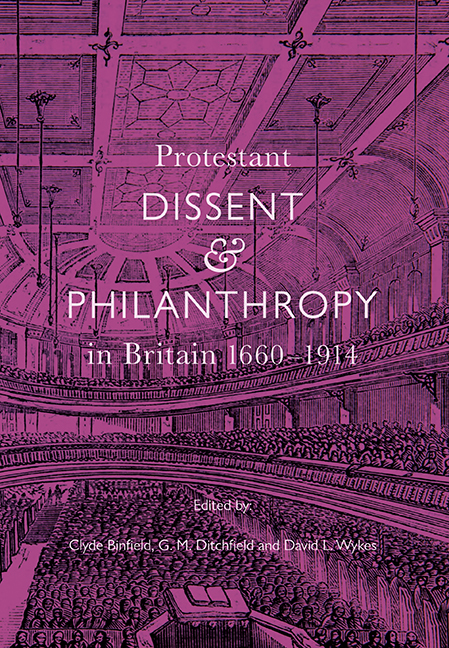Book contents
- Frontmatter
- Dedidcation
- Contents
- List of Illustrations and Tables
- List of Contributors
- Acknowledgements
- List of Abbreviations
- Introduction
- 1 Dissent and Charity, 1660–1720
- 2 Dissenters and Charity Sermons, c. 1700 to 1750
- 3 John Howard, Dissent and the Early Years of Philanthropy in Britain
- 4 Rational Philanthropy: Theory and Practice in the Emergence of British Unitarianism, c. 1750–1820
- 5 David Nasmith (1799–1839), Philanthropy Expressed as Campaigning
- 6 Building Philanthropy: The Example of Joshua Wilson (1795–1874)
- 7 Funding Faith: Early Victorian Wesleyan Philanthropy
- 8 Unitarians and Philanthropy After 1844: the Formation of a Denominational Identity
- 9 Children and Orphans: Some Nonconformist Responses to the Vulnerable in Victorian Britain
- 10 The Rowntree Family and the Evolution of Quaker Philanthropy, c. 1880 to c. 1920
- 11 ‘Not slothful in business’: Enriqueta Rylands and the John Rylands Library
- Select Bibliography
- Index
- STUDIES IN MODERN BRITISH RELIGIOUS HISTORY
10 - The Rowntree Family and the Evolution of Quaker Philanthropy, c. 1880 to c. 1920
Published online by Cambridge University Press: 21 March 2020
- Frontmatter
- Dedidcation
- Contents
- List of Illustrations and Tables
- List of Contributors
- Acknowledgements
- List of Abbreviations
- Introduction
- 1 Dissent and Charity, 1660–1720
- 2 Dissenters and Charity Sermons, c. 1700 to 1750
- 3 John Howard, Dissent and the Early Years of Philanthropy in Britain
- 4 Rational Philanthropy: Theory and Practice in the Emergence of British Unitarianism, c. 1750–1820
- 5 David Nasmith (1799–1839), Philanthropy Expressed as Campaigning
- 6 Building Philanthropy: The Example of Joshua Wilson (1795–1874)
- 7 Funding Faith: Early Victorian Wesleyan Philanthropy
- 8 Unitarians and Philanthropy After 1844: the Formation of a Denominational Identity
- 9 Children and Orphans: Some Nonconformist Responses to the Vulnerable in Victorian Britain
- 10 The Rowntree Family and the Evolution of Quaker Philanthropy, c. 1880 to c. 1920
- 11 ‘Not slothful in business’: Enriqueta Rylands and the John Rylands Library
- Select Bibliography
- Index
- STUDIES IN MODERN BRITISH RELIGIOUS HISTORY
Summary
This chapter focuses on a small and distinctive Dissenting sect, the Religious Society of Friends, or Quakers, whose contribution to philanthropy and social reform since the early modern period has often exceeded their modest numbers. It aims to explore the relationship between Quaker business endeavour and philanthropic behaviour, to assess the impact of theological and social change on Friends in the later nineteenth and early twentieth centuries, and to disentangle the different motivations for participation in organised philanthropy that operated within the denomination during a key period in its history. In a landmark study of Quakerism published in 2001, Thomas C. Kennedy described ‘the transformation of a religious community’ between 1860 and 1920, when the ‘new Quakerism’ grew in influence and authority within the Society of Friends. Kennedy has shown that the ending of the nineteenth century saw a Quaker ‘renaissance’ that reflected a transformation in social and religious thought among younger Friends in particular, and that reshaped their participation in public life. One of the key figures in the Quaker renaissance was John Wilhelm Rowntree (1868–1905), who exercised a significant intellectual and personal influence, both during his life and following his premature death. He was the eldest son of a prominent Quaker businessman and philanthropist, Joseph Rowntree (1836–1925), and it is the philanthropic activities of the Rowntree family that form the main topic of this chapter, which itself draws on a considerable body of earlier work. The establishment and early operation of the three trusts established by Joseph Rowntree in 1904 – the Joseph Rowntree Charitable Trust (JRCT), the Joseph Rowntree Social Service Trust (JRSST) and the Joseph Rowntree Village Trust (JRVT) – are a useful case study of the complex influences on the practice of Quaker philanthropy in this period.
Rowntree's three trusts – alongside similar trusts established by the Cadbury family, who influenced the Rowntrees in a number of ways – have been seen as marking a significant development in organised philanthropy, and they certainly exercised a powerful local and regional influence, through the provision of housing, the publication of newspapers, the funding of social research and the support of educational and other projects. This chapter makes three inter-related arguments.
- Type
- Chapter
- Information
- Protestant Dissent and Philanthropy in Britain, 1660–1914 , pp. 187 - 204Publisher: Boydell & BrewerPrint publication year: 2020



